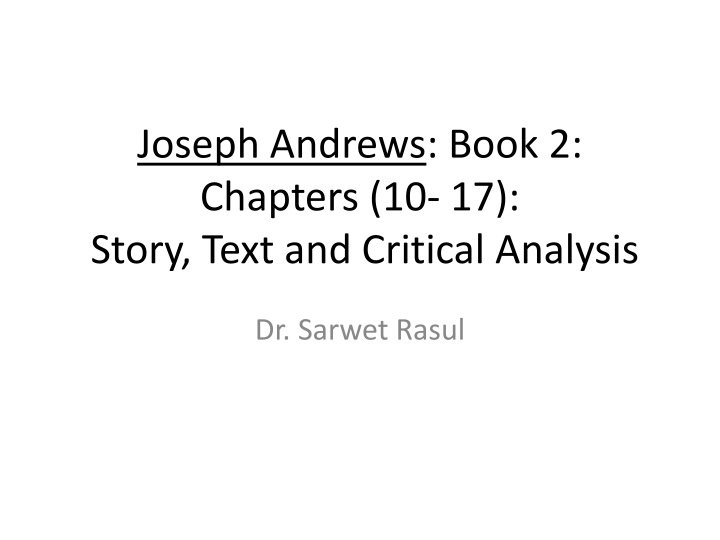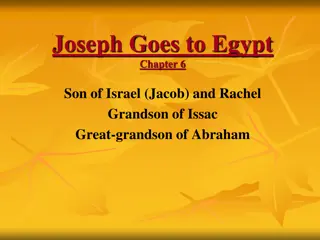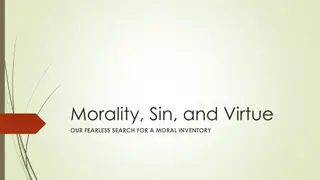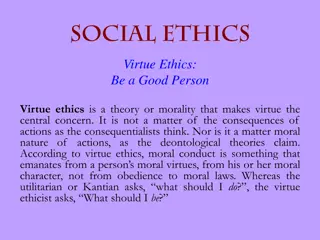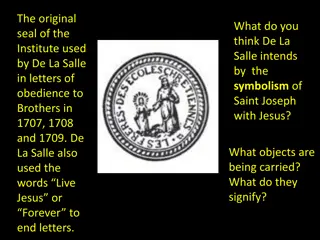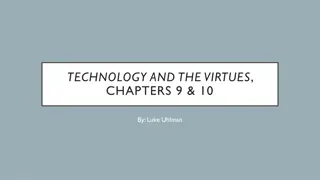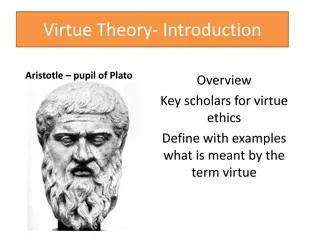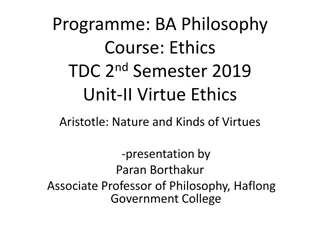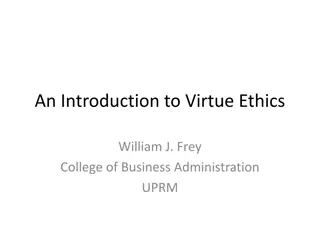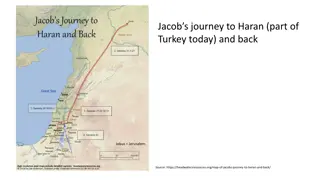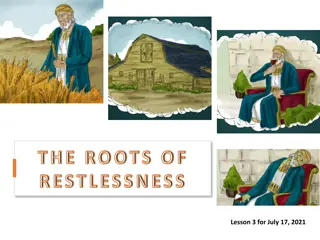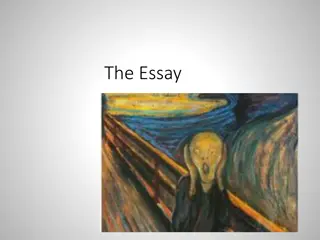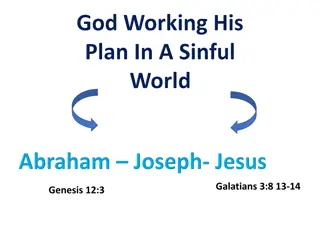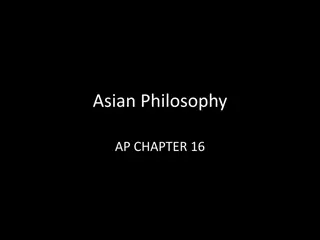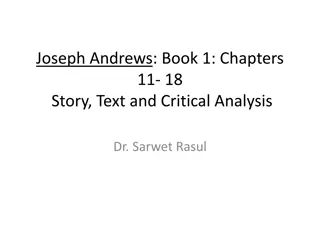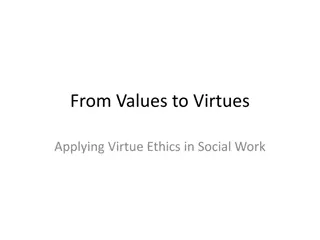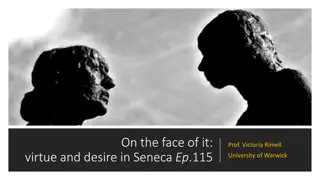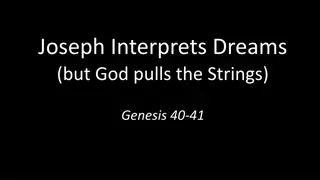Analysis of Selfishness and Virtue in Chapters 10-11 of Joseph Andrews
The text from Chapter 10 of Joseph Andrews explores themes of selfishness, materialism, and virtue as a group confronts the aftermath of an adventure. The characters argue over their shares of an 80-pound reward, revealing their self-serving nature. The chapter delves into the motivations and actions driven by selfish desires in contrast to virtuous conduct.
Download Presentation

Please find below an Image/Link to download the presentation.
The content on the website is provided AS IS for your information and personal use only. It may not be sold, licensed, or shared on other websites without obtaining consent from the author.If you encounter any issues during the download, it is possible that the publisher has removed the file from their server.
You are allowed to download the files provided on this website for personal or commercial use, subject to the condition that they are used lawfully. All files are the property of their respective owners.
The content on the website is provided AS IS for your information and personal use only. It may not be sold, licensed, or shared on other websites without obtaining consent from the author.
E N D
Presentation Transcript
Joseph Andrews: Book 2: Chapters (10- 17): Story, Text and Critical Analysis Dr. Sarwet Rasul
Review of the Previous Session Book 2 has 17 chapters, however, in the previous session we covered first nine chapters. (Chapter 1 to 9) Headings of chapters Summaries Points of Discussion Important parts of text with reference to themes, development of characters, plot and structure, Fielding as a moralist, his art of characterization etc. 2
Current Session As Book 2 has 17 chapters, in this session we will cover chapters 10- 17; and will finish this book. Headings of chapters Important happenings in these chapters Points of Discussion Important parts of text with reference to themes, development of characters, plot and structure, Fielding as a moralist, his art of characterization etc. 3
Heading Chapters 10, 11 Chapter 10 Giving an catastrophe of the preceding adventure, which drew poor Adams into fresh calamities; and who the woman was who owed the preservation of her chastity to his victorious arm. Chapter 11 What happened to them while before the justice. A chapter very full of learning. account of the strange 4
Book 2, Chapters 10-11 A group of young "bird-batters" discovers the distraught woman and her rescuer Adams. Adams tries to relate what has happened, but the clever villain interrupts with his own version of the story and tells them that he is a poor traveller who was robbed by a pair of thieves. Catching a pair of thieves sounds to be a more attractive sport than catching birds, and so the bird-batters march Adams and the woman off to the justice. The resigned Adams, constantly sympathetic toward his companion, misses an opportunity to escape, for when the clerk of the company mentions the possibility of an 80 pound reward they all start to bicker about their share. (See text on the next slide in this regard.) 5
Text from Chapter 10 TEXT: Theme of Selfishness, Materialism vs. Virtue Whilst they were on their way the clerk informed the rest that this adventure would prove a very beneficial one; for that they would all be entitled to their proportions of 80 for apprehending the robbers. This occasioned a contention concerning the parts which they had severally borne in taking them; one insisting he ought to have the greatest share, for he had first laid his hands on Adams; another claiming a superior part for having first held the lanthorn to the man s face on the ground, by which, he said, the whole was discovered. The clerk claimed four-fifths of the reward for having proposed to search the prisoners, and likewise the carrying them before the justice: he said, Indeed, in strict justice, he ought to have the whole. 6
Book 2, Chapters 10-11 As Adams cries in grief he mentions the name of Joseph Andrews, which leads to the revelation that the woman is none other than Joseph's beloved Fanny, who had heard of Joseph's misfortune, abandoned the cow she was milking, and set out to find Joseph. Though Fanny tries to conceal her passion for Joseph from Adams, who "never saw farther into people than they desired to let him," but Fielding as an omniscient and omnipresent author tells us that she loved Joseph very much. had immediately 7
Cont Book 2, Chapter 11 Adams and Fanny are put in a stable while the justice, just returned from a fox chase, finishes his dinner. Afterward, the justice, "being in the height of his mirth and his cups," proceeds to "have good sport" with them, without any regard to the issues at stake. (See some relevant text on the next slide) 8
Text from Chapter 11 TEXT: The justice, now being in the height of his mirth and his cups, bethought himself of the prisoners; and, telling his company he believed they should have good sport in their examination, he ordered them into his presence. They had no sooner entered the room than he began to revile them, saying, That robberies on the highway were now grown so frequent, that people could not sleep safely in their beds, and assured them they both should be made examples of at the ensuing assizes. After he had gone on some time in this manner, he was reminded by his clerk, That it would be proper to take the depositions of the witnesses against them. Which he bid him do, and he would light his pipe in the meantime. Whilst the clerk was employed in writing down the deposition of the fellow who had pretended to be robbed, the justice employed himself in cracking jests on poor Fanny, in which he was seconded by all the company at table. 9
Chapter 11 While lewd remarks are levelled at Fanny, a witty fellow spies Adams' cassock beneath his greatcoat and taunts him with several lines of Latin. Adams quickly challenges the wit's linguistic mistakes but, to the amusement of the crowd, he has no money to back up his wager. Meanwhile, the justice orders the clerk to make the mittimus (without reading a word of the de-positions), and the indignant objections from Adams do nothing to prick his conscience. 10
Text from Chapter 11 TEXT: Adams then said, He hoped he should not be condemned unheard. No,no, cries the justice, you will be asked what you have to say for yourself when you come on your trial: we are not trying you now; I shall only commit you to gaol: if you can prove your innocence at size, you will be found ignoramus, and so no harm done. Is it no punishment, sir, for an innocent man to lie several months in gaol? cries Adams: I beg you would at least hear me before you sign the mittimus. What signifies all you can say? says the justice: is it not here in black and white against you? I must tell you you are a very impertinent fellow to take up so much of my time. So make haste with his mittimus. 11
Cont Book 2, Chapters 10-11 At this point, the clerk introduces into the evidence Adams' copy of Aeschylus, which is literally and figuratively Greek to the justice, who mutters darkly about "cyphers." The parson of the parish fares little better with the book, and the justice triumphantly takes Aeschylus to be Adams' fictitious name. By chance, a squire in the crowd recognizes Adams and, when the justice hears Adams referred to as a clergyman and gentleman, he hastily tries to make amends. Adams gives the true account of the whole affair, which the justice believes as readily as he did the first version. The villain of the episode, however, has quietly withdrawn, leaving the bird-batters in a loud drunken quarrel concerning who would have received the most money had Adams been convicted. Adams takes a drink with the justice and, despite his wise observations on the folly of people who argue vehemently about matters of small import to them, he almost comes to blows with the justice in a debate on the conduct of the arraignment. Fanny interrupts the dispute when she learns that a young fellow is about to set out for the inn where Joseph's stagecoach has stopped. She and Adams accompany the young man to the inn. 12
Discussion Points The theme of incompetent clergymen is presented. Parson Trulliber is an example of all the incompetency and corruption in clergy. To provide spice to his satire, Fielding inserts a parody on "a knowledge of Latin" as well. Fielding was himself a magistrate and had first- hand knowledge of the abuse of common law by those supposed to be on the right side of it. This chapter provides insights into the corruption in the sphere of law. 13
Heading Chapters 12 A very delightful adventure, as well to the persons concerned as to the good-natured reader. 14
Book 2, Chapter 12 A storm forces Adams and Fanny to take shelter in an ale-house and, while Adams tests the brew, Fielding gives the reader a portrait of Fanny. She is exquisite, and even her few minor blemishes do not mar the overall effect of her beauty. (Let us read some text about her) 15
Text Chapter 12: Fieldings Art of Characterization Fanny s portrayal: Her hair was of a chesnut brown, and nature had been extremely lavish to her of it, which she had cut, and on Sundays used to curl down her neck, in the modern fashion. Her forehead was high, her eyebrows arched, and rather full than otherwise. Her eyes black and sparkling; her nose just inclining to the Roman; her lips red and moist, and her underlip, according to the opinion of the ladies, too pouting. Her teeth were white, but not exactly even. The small- pox had left one only mark on her chin, which was so large, it might have been mistaken for a dimple, had not her left cheek produced one so near a neighbour to it, that the former served only for a foil to the latter. Her complexion was fair, a little injured by the sun, but overspread with such a bloom that the finest ladies would have exchanged all their white for it: add to these a countenance in which, though she was extremely bashful, a sensibility appeared almost incredible; and a sweetness, whenever she smiled, beyond either imitation or description. To conclude all, she had a natural gentility, superior to the acquisition of art, and which surprized all who beheld her. 16
Cont Summary Book 2, Chapter 12 Her most important feature, however, is her "natural gentility." Returning to the narrative, Fielding inserts several verses of a long ballad about love, sung by a sweet-voiced young man in another part of the alehouse. We guess who he is when Fanny faints at the close of the song. Adams, astounded, leaps up, dropping his beloved copy of Aeschylus into the fire as he cries for help. The person who comes to rescue in response to these cries is no other than Joseph Andrews. The passionate reunion of embarrasses Fanny in front of Adams, while Adams skips in utmost joy. Joseph and Fanny 17
Book 2, Chapter 12 As Slipslop passes by Fanny extends curtsy but the jealous Mrs. Slipslop exits in a haughty sweep, completely ignoring Fanny's curtsy to her. This is mentioned at the end of chapter 12 by Fielding. Let us see the concluding text of chapter 12. 18
Concluding Text Chapter 12: About Slipslop again TEXT: Then, seeing Mrs Slipslop, she curtsied, and offered to advance to her; but that high woman would not return her curtsies; but, casting her eyes another way, immediately withdrew into another room, muttering, as she went, she wondered who the creature was. 19
Heading Chapters 13 A dissertation concerning high people and low people, with Mrs Slipslop s departure in no very good temper of mind, and the evil plight in which she left Adams and his company. 20
Summary points: Book 2, Chapter 13 The act of ignoring Fanny on the part of Slipslop is is a deliberate snub, and to explain Slipslop's behavior, Fielding explains his theory about the two classes into which people are divided the high and the low. (Let us see some relevant text) 21
Text from Chapter 13 TEXT: Justification of Slipslop s behaviour and Fielding as a moralist: Be it known then, that the human species are divided into two sorts of people, to wit, high people and low people. As by high people I would not be understood to mean persons literally born higher in their dimensions than the rest of the species, nor metaphorically those of exalted characters or abilities; so by low people I cannot be construed to intend the reverse. High people signify no other than people of fashion, and low people those of no fashion. Now, this word fashion hath by long use lost its original meaning, from which at present it gives us a very different idea; for I am deceived if by persons of fashion we do not generally include a conception of birth and accomplishments superior to the herd of mankind; whereas, in reality, nothing more was originally meant by a person of fashion than a person who drest himself in the fashion of the times; and the word really and truly signifies no more at this day. Now, the world being thus divided into people of fashion and people of no fashion, a fierce contention arose between them; nor would those of one party, to avoid suspicion, be seen publicly to speak to those of the other, though they often held a very good correspondence in private. 22
Cont Summary points: Book 2, Chapter 13 As these classes are composed of the fashionable and the unfashionable, the latter pursuing and aping the former all the way up the social ladder, while the former disdain their "inferiors." Adams, who is ignorant of these intricacies of the social mechanism, follows Slipslop and tries to jog her memory about Fanny, whom Slipslop now pretends to even not remember. While Adams praises Fanny's chastity, Slipslop, in her jealousy rebukes him for his violence in rescuing Fanny and criticizes Fanny's character. 23
Cont. Book 2, Chapter 12-13 Outside, the storm is now over and when it comes to resume journey, Joseph refuses to travel on without Fanny. While Adams dozes by the fire, Joseph and Fanny declare their love for each other. So, Joseph wakes Adams to ask him to marry them. Adams refuses, stressing the importance of publishing the banns; and asks Joseph to wait. The three of them prepare to start their journey as it is dawn now. However, some delay is caused by need for payment of seven shillings on their part. Adams is suddenly struck by an idea and asks the hostess if there is a clergyman in the parish. As he comes to know htat there is one, Adams joyfully leaves Fanny and Joseph, telling them that he has a "brother" in the parish who will pay the bill. He assures them that he will soon return with the much needed money. 24
Points of Critical Analysis The reunion of Fanny and Joseph brings out the truly charitable nature of Adams. He is extremely joyful at the happiness of others. Theme of affectation: Again the theme of affectation is stressed. In contrast to Adams sincerity, we can see the affected snobbishness of Slipslop. Her jealousy and hatred of Fanny reminds us of Lady Booby's behavior towards Betty. Theme of pretension: This imitation of "fashion" throughout the social scale provides Fielding with material for his lengthy digression. He, as a moralist discusses this theme in detail. Theme of Simplicity: Adams' joy at the reunion of both the lovers, his insistence on the proper rites and forms for the wedding of Joseph and Fanny, and his firm belief that his (Christian) brother will help him, all this reaffirms his simplicity. As the chapter closes, we have the feeling that the parson's simplicity over money matters is about to get him into trouble once again. 25
Headings of Chapters 14, 15 Chapter 14 An interview between parson Adams and parson Trulliber. Chapter 15 An adventure, the consequence of a new instance which parson Adams gave of his forgetfulness. 26
Book 2, Chapter 14-15 Adams arrives at the house of Parson Trulliber, who is more of a farmer than a clergyman, for his wife runs the dairy while he sees to the pigs, whom he resembles in size and nature. (Let us read some relevant text.) 27
Text from Chapter 14: About Parson Trulliber PARSON ADAMS came to the house of parson Trulliber, whom he found stript into his waistcoat, with an apron on, and a pail in his hand, just come from serving his hogs; for Mr Trulliber was a parson on Sundays, but all the other six might more properly be called a farmer. He occupied a small piece of land of his own, besides which he rented a considerable deal more. His wife milked his cows, managed his dairy, and followed the markets with butter and eggs. The hogs fell chiefly to his care, which he carefully waited on at home, and attended to fairs; on which occasion he was liable to many jokes, his own size being, with much ale, rendered little inferior to that of the beasts he sold. He was indeed one of the largest men you should see, and could have acted the part of Sir John Falstaff without stuffing. Add to this that the rotundity of his belly was considerably increased by the shortness of his stature, his shadow ascending very near as far in height, when he lay on his back, as when he stood on his legs. His voice was loud and hoarse, and his accents extremely broad. To complete the whole, he had a stateliness in his gait, when he walked, not unlike that of a goose, only he stalked slower. 28
Text from Chapter 14 TEXT: More about Trulliber His wife, who informed him of Mr Adams s arrival, had made a small mistake; for she had told her husband, She believed there was a man come for some of his hogs. This supposition made Mr Trulliber hasten with the utmost expedition to attend his guest. He no sooner saw Adams than, not in the least doubting the cause of his errand to be what his wife had imagined, he told him, He was come in very good time; that he expected a dealer that very afternoon; and added, they were all pure and fat, and upwards of twenty score a-piece. Adams answered, He believed he did not know him. Yes, yes, cried Trulliber, I have seen you often at fair; why, we have dealt before now, mun, I warrant you. Yes, yes, cries he, I remember thy face very well . 29
Book 2, Chapter 14-15 Trulliber thinks that Adams has come to buy some of his hogs, and receives him with a great enthusiasm. Adams is so confused at this mistaken enthusiasm that in confusion he takes hold of a pig's tail; the pig leaps up and throws Adams down in the mire. While Adams cries, Trulliber is amused by the incident and asserts that his wife is to blame for the misunderstanding. Once inside and cleaned up a bit, Adams reveals who he is and what he has come for that is money, Trulliber's tone suddenly changes. His hypocrisy is very evident. Adams is no clergyman, but a vagabond, he roars, and, at the same time, berates his poor wife. When Adams calmly tells Trulliber that to him heis not a true Christian because he does not actively practice charity, Trulliber doubles up his fists, and is ready to fight over the issue. But, Adams is not provoked, and leaves with the remark that he is sorry to see such men in religious orders. 30
Cont Book 2, Chapter 14-15 The parson returns to Joseph and Fanny without any money. But the hostess surprises them all by allowing them credit and wishing them a good journey. Her generosity, however, is not genuine she has misunderstood Joseph and believes Adams to be the natural brother of Trulliber, not merely his "brother in divinity." As they are about to leave, Adams remembers that he left his greatcoat and hat at Trulliber's house. The hostess offers that she will go to Trulliber s place to fetch these for him. As she goes there, reality is revealed to her. She is also rebukedc by Trulliber. On her return she demands her money. At this point of tension, chance plays its role as a fellow traveler in the inn who has overheard the hostess' hard remarks takes Adams aside and asks him how much is owed. A loan is made and Adams, Fanny, and Joseph are saved by the goodness of a poor peddler. After telling the peddler where to call to be repaid the travelers leave. 31
Critical Analysis The subject of these two chapters is true charity Trulliber is a boor, the worst of the six incompetent parsons we meet in Joseph Andrews. His concerns are very much with this world he has no feeling for his guest either as a man or as a fellow parson he bullies his wife unmercifully, and worst of all he is entirely ignorant of the meaning of charity: "I know what charity is, better than to give to vagabonds." He rages to Adams about his appearance, commenting sarcastically upon his shabby cassock and his lack of a horse; for him the "dignity of the cloth" has a literal meaning only. The nature of his hypocrisy links him to that other odious parson, Barnabas. Both men ignore the importance of good works; Trulliber, indeed, does nothing to help Adams, and his own attitude is echoed throughout his parish. One is reminded here of Adams' criticism of George Whitefield's "detestable doctrine of faith against good works" in Book I, Chapter 17. The hostess is dominated by the worldly patronage of Trulliber, and her hypocrisy has the stamp of her master; her comment that people should not pretend to be what they are not is as ironic as Trulliber's claim to know what charity is. It is only the poor peddler who knows the true nature of charity. As with the postillion who offers his greatcoat to the battered Joseph (Book I, Chapter 12), society has not been kind to this truly compassionate man. 32
Points of Critical Analysis Humour in the novel: The handling of Adams' confrontation with Trulliber shows Fielding's artistry at his best. There is, first of all, the warm humour of Adams' simplicity and unfortunate tumble into the mire. We have already witnessed as readers the episode of hog's blood. The innocence of Adams is beautifully compounded into a classic reversal as Trulliber realizes that far from being paid money he is being asked for it. Fielding's successfully uses Trulliber's wife to lend an extra dimension to the conflict between Trulliber and Adams. The farcical tone is there too, specially the way in the opening opening part of the chapter Fielding describes Trulliber. 33
Headings of Chapters 16, 17 Chapter 16 A very curious adventure, in which Mr Adams gave a much greater instance of the honest simplicity of his heart, than of his experience in the ways of this world. Chapter 17 A dialogue between Mr Abraham Adams and his host, which, by the disagreement in their opinions, seemed to threaten an unlucky catastrophe, had it not been timely prevented by the return of the lovers. 34
Book 2, Chapter 16-17 On the road again, the travellers meet a gentleman who appears to be perfect in openness and magnanimity. He invites them to share some refreshment with him in the inn of the parish. There he owns a large mansion and offers Adams to live in this particular parish. Apart from this generous offer, the gentleman suggests that they avail themselves of his hospitality for a couple of days; Adams is overcome, but no sooner have Adams, Joseph and Fanny accepted than the gentleman suddenly "remembers" that his housekeeper is away. 35
Cont Book 2, Chapter 16-17 Interestingly next morning, he also finds himself unable to provide the horses he had promised. Adams is disturbed by the way this good- natured gentleman is abused by his servants. Joseph suspects his sincerity and is more concerned about how they are going to pay the bill for their night's lodging at the inn. However, soon it is confirmed by the host that Joseph s suspicions gentleman s generosity and sincerity are true. The host also relates previous examples of the emptiness of this gentleman's promises. abut the 36
Cont Book 2, Chapter 16-17 These chapters present Fielding as a moralist again. He presents his ideas related to traveling, trade and other aspects of life through the discussion of Adams and the host. The host claims that experience is the best teacher, and extends his argument to defend the practice of trade, which, he claims, provides clothes, wine and other necessities of life. Adams has a different perspective and these things, to Adams, are luxuries not necessities. Fortunately for the peace of all, Joseph and Fanny, who have been conversing in the garden, interrupt the argument and the three their journey 37
Points of Critical Analysis Themes of Hypocrisy vs. True Charity Fielding continues to stress the themes of hypocrisy and true charity. Adams being extremely innocent once again judges people at face value and is naively ecstatic at the hollow offers of the gentleman believing his charity to be of the true primitive kind. It is a sign of Joseph's increasing maturity that his estimation of the gentleman is more accurate. his perception is based on experience which never seems to remain with Adams. As Adams argues with the host Fielding presents two kinds of learning one based books, but the other based on the practicality of life. Although Adams convincingly emphasizes the importance of spiritual nourishment, we should remember that the host has just demonstrated the essentially practical nature of charity in which Fielding believes very strongly, and which he has advocated throughout the novel. 38
Reference list of sources http://www.cliffsnotes.com www.gradesaver.com www.enotes.com www.bartleby.com www.gutenberg.org http://www.helium.com http://www.studymode.com 39
Review of the current session As Book 2 has 17 chapters, in this session we have covered chapters 10- 17; and have finished this book. Headings of chapters Important happenings in these chapters Points of Discussion Important parts of text with reference to themes, development of characters, plot and structure, Fielding as a moralist, his art of characterization etc. 40
